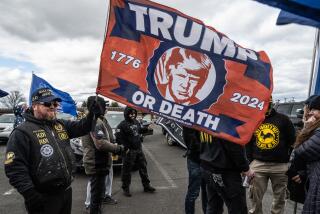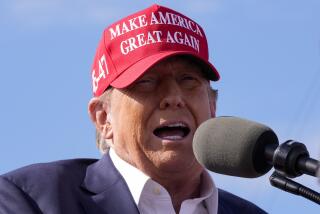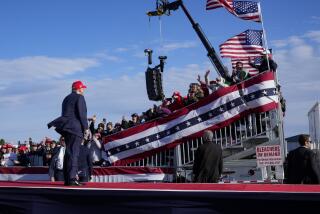Op-Ed: Campaign 2016’s anti-Semitism has me feeling conspicuously Jewish this Christmas season
Like many secular Jews in the United States, I celebrate Christmas. My wife, who is nominally Christian in much the way that I am nominally Jewish, bought a little fake tree with lights, and on the 25th we’ll hang stockings and exchange presents. Why not? My Judaism isn’t central to who I am. I’m not particularly conscious of it, and it doesn’t set me apart.
At least, it didn’t until recently.
My country has long let me hold my background loosely. When I was in middle school, there was an incident or two during which kids threw pennies at me — because Jews are greedy, get it? That was 30 years ago, though, and since then I can’t think of many instances in which I’ve faced discrimination or faith-based bullying. Despite the nose and the name, most people don’t notice that I’m Jewish. Lots of people claim that they don’t see race, but in the U.S., at least, Judaism is often truly invisible.
Donald Trump and his cronies, however, are working hard to change that. Trump dabbled in anti-Semitic dog-whistles throughout the campaign. His final advertisement before the election suggested that Hillary Clinton and Jewish bankers had joined forces to strip “our country of its wealth.” He plans to appoint as his chief strategist Steve Bannon, a man who as editor of Breitbart trafficked in anti-Semitic conspiracy theories, and who has expressed anti-Semitic views personally. The president-elect has been lauded and endorsed by the neo-Nazi alt-right, and anti-Semitic Twitter trolls have targeted Jewish journalists reporting on Trump.
For many people, identity politics isn’t a choice — it’s something they’ve been backed into by folks who...have decided to exclude them.
Trump has made anti-Semitism an active force in American politics in a way it has not been in decades. I know there’s a good chance that, by writing this article, I’ll expose myself to some degree of anti-Semitic hate online. Trump has created a political environment in which I am more visible, and more vulnerable, as a Jew. As a result, I ‘m more conscious of myself as a Jew. My nominal religion is part of my political identity in a way it wasn’t before Trump showed up.
Following the election, numerous commentators argued that identity politics were Clinton’s downfall. Mark Lilla, a humanities professor at Columbia University, sneered at “a generation of liberals and progressives narcissistically unaware of conditions outside their self-defined groups, and indifferent to the task of reaching out to Americans in every walk of life.”
For Lilla, and NYU social psychologist Jonathan Haidt, it’s dangerous and divisive to see the world through the lens of marginalized identities. We need to reach out to others and find common ground.
What they don’t understand is that, for many people, identity politics isn’t a choice — it’s something they’ve been backed into by folks who, out of prejudice or political expediency or some combination of the two, have decided to exclude them.
When the Nazis took power, many German Jews were fully assimilated. A few, as German nationalists, even supported Hitler. Despite Nazi claims to the contrary, it was Hitler’s hatred that created Jewishness as a political identity in Germany, not Jewish identity politics that created Hitler’s hatred.
Today, African Americans aren’t joining the Black Lives Matter movement because they reject the concept of a universal community — they’re joining because they’ve long been singled out for police violence. As Frederick Douglass said, “The man struck is the man to cry out.”
Let’s not shift the blame for prejudice from those who hate to the target of the hatred. Black Lives Matter activists and feminists and immigrants didn’t push anyone to vote for Trump. Rather, the hatred that Trump has inherited, and which he fans, is what has forced people in America to be conscious of their political identities as Mexicans, as African Americans, as women, as trans people, and, sometimes, as Jews.
Which is why for me, as a Jew, as for many others, this is a cold holiday season.
Noah Berlatsky is the author of “Corruption: American Political Films.”
Follow the Opinion section on Twitter @latimesopinion or Facebook
More to Read
A cure for the common opinion
Get thought-provoking perspectives with our weekly newsletter.
You may occasionally receive promotional content from the Los Angeles Times.






